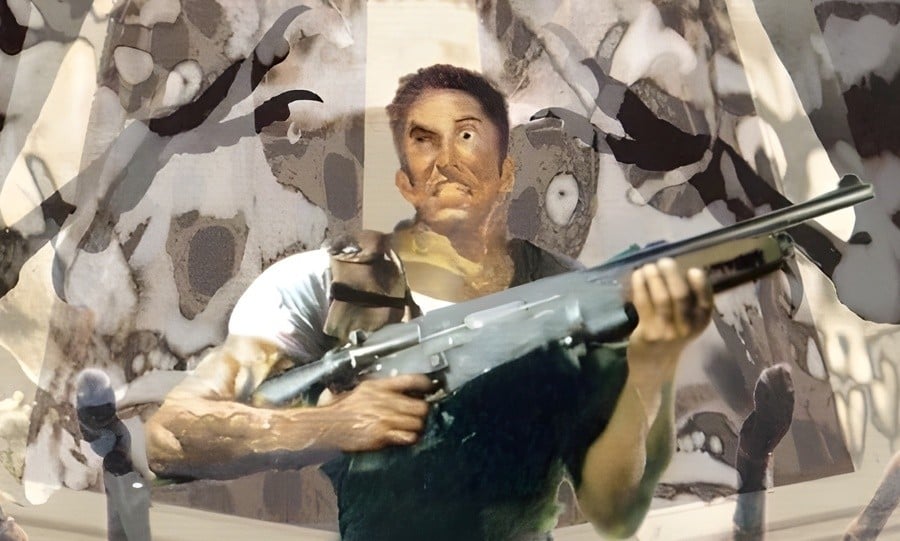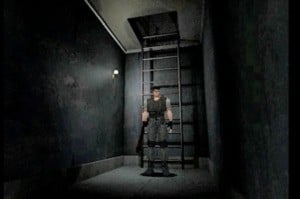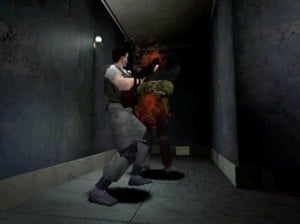
As part of our end-of-year celebrations, we're digging into the archives to pick out some of the best Time Extension content from the past year. You can check out our other republished content here. Enjoy!
Imagine this. You’re sitting at home playing Resident Evil, carefully guiding your character through the horrors of the Spencer Mansion, when suddenly you enter a new room and are confronted with the sound of what one YouTuber commentator famously described as a chorus of “clowns farting in a basement”.
The "Basement Theme", to give this piece of music its real name, has become a source of both memes and rampant speculation inside the Resident Evil fanbase. This is primarily down to its baffling choice of instrumentation, with even Capcom’s internal composers disappointed at its eventual inclusion in the Dual Shock Version of the Director's Cut. So how did it get into the game? And why does it differ from the original version in the first place? We set out to investigate.
The story begins in 1998 when Capcom struck a high-profile deal with the Japanese composer Mamoru Samuragochi, dubbed "the Japanese Beethoven" due to his incredible musical ability and his apparent inability to hear. This deal stated that Samuragochi would compose an entirely new symphonic for the Dual Shock Version of Resident Evil director's score, replacing the original score by Capcom's in-house composers: Makoto Tomozawa, Akari Kaida, and Masami Ueda. But behind the scenes, there was a problem.
As revealed much later in 2014, Samuragochi was living a lie. He wasn't the talented composer he had let the world think he was. And oddly enough, he wasn't even deaf. Instead, Takashi Niigaki, a music teacher and Samuragochi's conductor, had been ghostwriting Samuragochi's music in secret, including arguably his most famous piece Symphony No. 1 Hiroshima.
Niigaki announced this news to the world at a press conference at the Winter Olympics in Sochi in 2014, just as Japanese figure skater Daisuke Takahashi was about to give a performance to Samuragochi's Sonatina for Violin. And for many Resident Evil fans, it has since become accepted as one possible explanation as to why the Basement Theme ended up in such a baffling state. But this doesn't necessarily make sense to us.
You see, if Niigaki had been writing Samuragochi's music, surely the basement theme would also match up to his other compositions in quality. After all, he is also credited as a collaborator on the game. No, there must have been another explanation, and after some internet trawling, we think we may have found it.

A year after Niigaki's press conference, in 2015, the YouTuber Agent Red Jackal uploaded a quick and simple fix for the basement theme that introduced another possible explanation for this mystery. They used an AI program to transcribe the piece of music to MIDI and made a few simple changes to the track, switching the SoundFont from a trumpet to voice and adding reverb to make things sound a bit spookier.
These small changes went a long way to fixing many of the track's problems. But could it really be that a multi-million dollar company could let something so fixable as an incorrect SoundFont slip through its net? Well, we believe so.
You see, when we reached out to the various people who were involved with the sound design and composition for the original Resident Evil, it seems like none of them, despite being credited, worked on this version of the game, being far too busy with Resident Evil 2.
Instead, Samuragochi, Niigaki, and a skeleton crew of only three music data editors (Syun Nishigaki, Shusaku Uchiyama, and Yoshino Aoki) were responsible for composing and assembling the entire soundtrack for this version of the game.

As a result, it's incredibly likely that the SoundFont just got messed up somewhere during production, and nobody noticed until it was too late. And given that the DualShock version was simply a contractual obligation to Sony to sell units of its DualShock controller, it probably didn't make sense to do a costly reprint, with Capcom having to, unfortunately, grin and bear it.
The Resident Evil sound designer, Hideaki Utsumi, tells us, "I agree. It sounds like an error. This is not the original Resident Evil music, but the DualShock version where all the music was replaced with Mamoru Samuragochi's music. As you may know, Mamoru Samuragochi became a hot topic for a while."
Akari Kaida, one of the original composers, adds, "We, the composers of the original Resident Evil, do not know why that was in the Director's Cut version. Personally, I feel the same about [the music as the fans] and I am so sorry. I can say that 'music' was not written by any of us who were the composers of Capcom."
We've tried to reach out to the three data editors, as well as Niigaki and Samuragochi to get a definitive answer, but over the last few weeks, we've been met with complete silence. All the signs seem to point to the track being an unfortunate error though, as opposed to another casualty of Samuragochi's deception.
We're not sure how controversial this statement is — we'll soon find out, we guess — but the more we looked into this mystery the more we were kind of glad that a mistake like this happened. It's certainly done the DualShock version of the game a good turn, keeping it in the minds of Resident Evil fans all these years later. But more importantly, it's provided its community with hours of entertainment and unexpected laughs, becoming part of the greater culture surrounding the game.
Did you own the DualShock edition of Resident Evil Director's Cut? Let us know in the comments below!







Comments 5
Despite how much I absolutely despise this song (and how I'm annoyed that it was the DC version Sony went with for their PS Plus retro game selection), it possesses such an air of amateurish energy that I find it hard not to make a slight smile whilst listening to it. It's no wonder it became a meme later on in life: how do you make something so obviously awful?
This seems most likely and totally feasible. I sold my Dual Shock version because the music just isn't a good. Especially this horrible piece. 🤣
I honestly don't recall much on the different soundtrack but it's always fun hearing these bits of info from the past.
I was lucky enough to end up with the original DC release. Bought it because it came with the RE2 demo and I really wanted to play it. This same copy is hanging on my wall of fame in a shadowbox I created. You can check a pic of it in the link below. Resident Evil was my favorite series from its 1996 release all the way through RE5 in 2009.
https://www.vgcollect.com/gallery/Telekill
@Father-Noo Thank you. It was my Pandemic Project. Took about 2 1/2 years and kept me creative.
Each box has a...
I decided to do one per generation that I've been gaming. I did the Destiny one for my brother for Christmas 2021. So far, Witcher series and A Plague Tale series are in competition for the PS5 gen... but it's far from over.
So glad we got the version with the better soundtrack on the PSN store in Europe.
Tap here to load 5 comments
Leave A Comment
Hold on there, you need to login to post a comment...